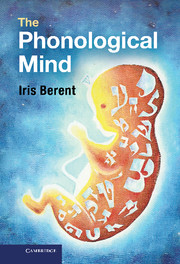Book contents
- Frontmatter
- Contents
- Figures
- Tables
- Copyright acknowledgements
- Preface
- Part I Introduction
- Part II Algebraic phonology
- Part III Universal design
- 6 Phonological universals
- 7 Phonological universals are mirrored in behavior
- 8 Phonological universals are core knowledge
- Part IV Ontogeny, phylogeny, phonological hardware, and technology
- References
- Index
8 - Phonological universals are core knowledge
evidence from sonority restrictions
Published online by Cambridge University Press: 05 February 2013
- Frontmatter
- Contents
- Figures
- Tables
- Copyright acknowledgements
- Preface
- Part I Introduction
- Part II Algebraic phonology
- Part III Universal design
- 6 Phonological universals
- 7 Phonological universals are mirrored in behavior
- 8 Phonological universals are core knowledge
- Part IV Ontogeny, phylogeny, phonological hardware, and technology
- References
- Index
Summary
This chapter examines the representation of grammatical phonological universals by pursuing an in-depth analysis of a single case study – the sonority restrictions on complex onsets (e.g., bl in block). Across languages, syllables like iblock are reliably favored over syllables like lbock. Of interest is whether these preferences reflect universal grammatical restrictions. We address this question in two steps. We first show that sonority restrictions are plausible candidates for a grammatical universal – they are amply evident in productive phonological processes and supported by typological data. We next proceed to examine whether this putative universal constrains people’s behavior in psychological experiments. Results from numerous experiments demonstrate that people are sensitive to sonority restrictions concerning onsets that they have never heard before. Sonority preferences, moreover, cannot be explained by several non-grammatical sources, including the phonetic properties of the experimental materials and their similarity to onsets that are attested in participants’ languages. By elimination, then, I conclude that people’s behavior is shaped by grammatical restrictions on sonority, and these restrictions extend broadly, perhaps universally, even to structures that are unattested in a speaker’s language. These conclusions suggest that universal grammatical restrictions might be active in the brains and minds of individual speakers.
Grammatical universals and experimental results:
The results described in the previous chapter suggest that people’s performance in psychological experiments mirrors putative universal grammatical constraints: Unmarked phonological structures – those that are systematically preferred across languages – are the ones learned more readily by individual speakers. While the correlation between human performance and grammatical constraints is suggestive, correlation is not evidence for causation. And indeed, the agreement between the typological and behavioral data could be due to various sources external to the grammar. The learning advantage of unmarked structures might reflect not existing universal knowledge that favors unmarked structures, but rather the fact that such structures are independently easier to process. The question then remains whether grammatical principles are, in fact, universally active in the brains of all speakers. More generally, our question is whether grammatical principles form part of a phonological system of core knowledge.
- Type
- Chapter
- Information
- The Phonological Mind , pp. 165 - 198Publisher: Cambridge University PressPrint publication year: 2013



